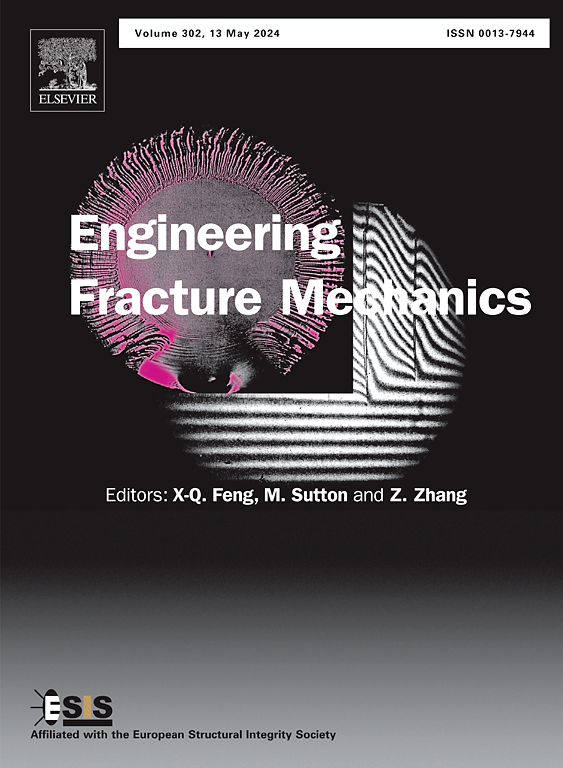Model for predicting type Ι fatigue crack growth rate in RKE field considering stress gradient
IF 4.7
2区 工程技术
Q1 MECHANICS
引用次数: 0
Abstract
Based on the stress–strain field at the crack tip of Rice-Kujawski-Ellyin (RKE) and considering the stress gradient effect near the crack tip of type I, a fatigue crack growth rate prediction model L-SG (RKE) for type I is proposed in this paper. Firstly, the stress gradient change value of 1 % at the crack tip is considered as the characteristic distance (stress gradient influence range), and the ratio of the equivalent stress to the far-field stress in the stress gradient influence range is defined as the stress gradient influence coefficient ρ; Secondly, the new model L-SG (RKE) is proposed to quantitatively describe the fatigue crack growth behavior by using the stress–strain field at the crack tip of RKE, and the stress gradient influence coefficient ρ is introduced, and then the crack tip passivation radius rp is defined to eliminate the crack tip singularity, and the plastic strain energy failure criterion is combined.; Finally, the prediction effect of the L-SG (RKE) model is verified by 6 metal materials and the fatigue crack growth rate test results of 2 groups of 45 steel CT specimens, and compared with the SHI-CAI (RKE) model. At the same time, based on the R2 fitting effect and the different requirements of the three stages of fatigue crack propagation, the prediction effect of the two prediction models is analyzed, and comprehensive evaluation from two aspects of safety and accuracy. The results show that the L-SG (RKE) prediction model can better reflect the actual fatigue crack propagation behavior, and can meet the requirements of practical engineering for the accuracy and safety of the prediction model. Especially, the prediction results of physical cracks in 45 steel shaft parts by this model agrees well with the experimental data.
考虑应力梯度的 RKE 场中Ι型疲劳裂纹生长率预测模型
本文以 Rice-Kujawski-Ellyin (RKE) 裂纹尖端的应力应变场为基础,考虑 I 型裂纹尖端附近的应力梯度效应,提出了 I 型疲劳裂纹生长率预测模型 L-SG (RKE)。首先,将裂纹尖端 1 % 的应力梯度变化值视为特征距离(应力梯度影响范围),并将应力梯度影响范围内的等效应力与远场应力之比定义为应力梯度影响系数 ρ;其次,提出新模型 L-SG (RKE),利用 RKE 的裂纹尖端应力应变场定量描述疲劳裂纹生长行为,并引入应力梯度影响系数 ρ,然后定义裂纹尖端钝化半径 rp 以消除裂纹尖端奇异性,并结合塑性应变能失效准则。最后,通过 6 种金属材料和 2 组 45 个钢 CT 试件的疲劳裂纹生长率测试结果验证了 L-SG (RKE)模型的预测效果,并与 SHI-CAI (RKE)模型进行了比较。同时,基于 R2 拟合效果和疲劳裂纹扩展三个阶段的不同要求,分析了两种预测模型的预测效果,并从安全性和准确性两个方面进行了综合评价。结果表明,L-SG(RKE)预测模型能较好地反映实际疲劳裂纹扩展行为,能满足实际工程对预测模型准确性和安全性的要求。特别是该模型对 45 个钢轴零件物理裂纹的预测结果与实验数据吻合较好。
本文章由计算机程序翻译,如有差异,请以英文原文为准。
求助全文
约1分钟内获得全文
求助全文
来源期刊
CiteScore
8.70
自引率
13.00%
发文量
606
审稿时长
74 days
期刊介绍:
EFM covers a broad range of topics in fracture mechanics to be of interest and use to both researchers and practitioners. Contributions are welcome which address the fracture behavior of conventional engineering material systems as well as newly emerging material systems. Contributions on developments in the areas of mechanics and materials science strongly related to fracture mechanics are also welcome. Papers on fatigue are welcome if they treat the fatigue process using the methods of fracture mechanics.

 求助内容:
求助内容: 应助结果提醒方式:
应助结果提醒方式:


